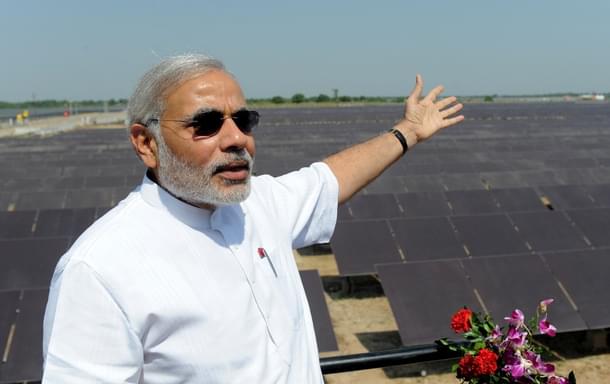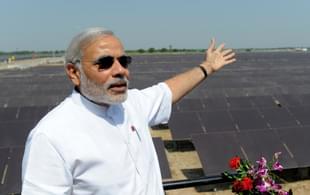Current Affairs
Morning Brief: New Solar Capacity Milestone; India Sixth Wealthiest Country: Report: Hafiz Saeed Plans Kashmir Solidarity Rally
Swarajya Staff
Jan 31, 2018, 06:20 AM | Updated 06:20 AM IST
Save & read from anywhere!
Bookmark stories for easy access on any device or the Swarajya app.


Good morning, dear reader! Here’s your morning news and views brief for today.
India Achieves 20GW Solar Capacity Milestone: The renewable energy push by the Narendra Modi government is showing results. India has achieved 20 gigawatt (GW) cumulative solar capacity, hitting the milestone four years ahead of the target for 2022 originally set in the National Solar Mission. The achievement comes on the back of a major renewable energy push by Modi government, which after coming to power in 2014 had scaled up the target to 100 GW of solar capacity by 2022. According to the latest India research report by green energy market tracker Mercom Capital, the utility-scale cumulative installations now stand at approximately 18.4 GW, with rooftop solar accounting for another 1.6 GW. For the first time, solar was the top source of new power capacity additions in India during the calendar year 2017, with preliminary figures showing solar installations reaching 9.6 GW in this period and accounting for 45 per cent of total capacity additions.
Government U-Turn On Orange Coloured Passports: The Union government has scrapped its plan to issue orange coloured passports to those who have not passed their Class X examination. It has also decided not to discontinue printing the last page of the passport, which is used as a valid proof of address. Passports currently are issued in three colours. Government officers have a white passport, diplomats are issued red passports and all other passports are blue. A public interest litigation challenging the issuance of orange-colour passports was filed in the Kerala High Court, in which the petitioner argued that such a move would lead to segregation of people with low education and low economic status. The government had announced these changes earlier this month, but Foreign Minister Sushma Swaraj reviewed the decision after a spate of protests and representations.
Kerala Woman Forcefully Converted To Islam, Almost Sold To Islamic State By Husband: NIA: The National Investigation Agency (NIA) said it has registered a case against nine people from Kerala and Karnataka for allegedly being involved in forcible conversion of a Gujarat-based woman and attempting to sell her off to Islamic State terrorists in Saudi Arabia. The case was registered against them following a complaint from the 25-year-old woman who alleged that Muhammed Riyas Rasheed had lured her and taken objectionable pictures of her, besides illegally confining her. According to NIA, the complainant also said that the accused had married her through deceit by forging documents and "forcibly converted her to Islam". Rasheed, according to the NIA, had illegally confined and threatened her in Kerala before taking her to Jeddah, Saudi Arabia in August 2017 for joining Islamic State. The petitioner, originally a Keralite, was born and brought up in Jamnagar in Gujarat.
New Supercomputer For Better Weather Forecast: India commissioned a supercomputer – one of the most powerful in the world and fastest in the country – in order to come out with block-level weather forecast later this year. “India comes fourth in terms of having a dedicated high-performance computing resource for climate, after the US, UK and Japan,” said Union Minister for Science and Technology Dr Harsh Vardhan. This is the second supercomputer procured by the ministry of earth sciences for the purpose this month, with the first being installed at the Indian Institute of Tropical Meteorology in Pune. This unit will be used at the National Centre for Medium Range Weather Forecast in Noida. The combined peak capacity of both the supercomputers, which cost Rs 450 crore, is 6.8 petaflops (a measure of processing speed). This will add to the 1.2 petaflop capacity of existing equipment. The supercomputers will generate high-resolution models to help scientists at the ministry of earth sciences provide block-level weather forecasting data. Data is currently available at the district level.
Supreme Court And High Court Judges Get Around 200 Per Cent Pay Hike: Supreme Court and high court judges have got a 200 per cent salary hike with the Centre notifying a new law. The salary hike, which is in line with the recommendations of the 7th Pay Commission for officers of all-India services, will come into force retrospectively from 1 January 2016. The Chief Justice of India will now get a monthly salary of Rs 2.80 lakh, up from the present Rs 1 lakh. Similarly, judges of the Supreme Court and chief justices of high courts will draw a monthly salary of Rs 2.50 lakh, up from the current Rs 90,000, according to the Act notified by the Law Ministry. The judges of high courts, who get Rs 80,000 per month now, will get Rs 2.25 lakh. Now, the salary of judges will be at par with those of bureaucrats following the implementation of the recommendations of the 7th pay panel.
JuD Chief Hafiz Saeed Plans 10-Day ‘Kashmir Solidarity Ashra’: Mumbai terror attack mastermind and Jamaat-ud-Dawa chief Hafiz Saeed said his group will organise a 10-day ‘Kashmir solidarity Ashra’ in Pakistan starting from 2 February. “We will hold rallies, conferences and seminars across Pakistan to show solidarity with the Kashmiris,” Saeed said. Claiming that he spent 10 months under house arrest only because he raised voice against the alleged “Indian atrocities” and Pakistani government’s “impotence”, Saeed alleged that the authorities want to take action against him amid sustained pressure from the US. Saeed, the founder of Falah-i-Insaniat Foundation and a UN-designated global terrorist, carries a $10 million bounty on his head. Announcing his foray into the electoral politics, last month Saeed had said he would dedicate 2018 to “Kashmiris who are struggling for freedom.” Earlier this month, the US has told clearly to Islamabad that Saeed is a “terrorist” and should be prosecuted to the fullest extent of the law.
India Extends Munabao-Khokhrapar Rail Link With Pakistan For Three Years: India has extended an agreement with Pakistan linking the two countries through the Munabao- Khokhrapar rail line, said the railways. "We are happy to extend the rail link. The train, Thar Express, is pre-booked till March 2018," a railway official said. The agreement to link the two countries by rail was signed in 2006 to facilitate people-to-people contact, officials said. The agreement was set to expire in March 2018, but has now been extended to 31 January 2021. The two sides currently have only two trans-border trains. The Samjhauta Express operates on the Delhi-Lahore route via the Attari-Wagah border crossing and carries both passengers and freight. The Thar Express links Jodhpur and Karachi via the Munabao-Khokhrapar border crossing and carries only passengers.
India Is Sixth Wealthiest Country, Says Report: With a total wealth of $8,230 billion, India has been ranked sixth in the list of wealthiest countries. According to a report by New World Wealth, the US is the wealthiest country with total wealth of $64,584 billion, followed by China ($24,803 billion) and Japan ($19,522 billion). Others in the list include United Kingdom (4th, $9,919 billion), Germany (5th, $9,660 billion), France (7th, $6,649 billion), Canada (8th, $6,393 billion), Australia (9th, $6,142 billion) and Italy (10th, $4,276 billion). Total wealth refers to the private wealth held by all the individuals living in each country/city. It includes all their assets (property, cash, equities, business interests) less any liabilities. The report, however, excludes government funds from its figures. According to the New World Wealth report, India was the best performing wealth market globally in 2017 as its total wealth rose 25 per cent from $6,584 billion in 2016 to $8,230 billion in 2017.
Saudi Arabia Nets $107 Billion In Graft Settlements: Saudi Arabia has recovered $107 billion so far in a major crackdown on high-level corruption and that 56 suspects were still being investigated, the country's attorney general said on Tuesday. In November, the authorities launched an unprecedented anti-graft swoop that netted hundreds of members of the extended royal family, top businessmen and officials. Sheikh Saud Al Mojeb said he has completed inquiries into 381 high-profile corruption suspects and decided to keep 56 in custody and free the rest. Those released include individuals proven not guilty but also others who had agreed financial settlements with the government after admitting corruption charges, he said. Total settlements with the suspects had topped 400 billion riyals ($107 billion) in various forms of assets handed over that included property, securities and cash.
MUST READ OPINIONS AND COLUMNS
Is India On The Cusp Of A Fiscal Revolution? The fact that India is creating more formal sector jobs than most people assume, plus average incomes nearing $2,000, provides the initial conditions for a fiscal revolution.
After Budget 2018, Centre And States Need To Focus More On Cooperative Federalism: The key challenge to deepening federalism in India, as this ongoing battle over CSS demonstrates, lies in determining the optimal allocation of functions across levels of government. Addressing this challenge will require debate and consensus building.
Taking A Leaf Out Of GST Book For Income Tax Reforms: Tax policy and principles are built on a solid foundation, and they should work as efficiently and effectively on all kinds of business models. Income tax reforms need is a committee like the GST Council for simplifying the tax law.
SWARAJYA SPECIAL
The Dalit Atrocity Story From Haryana They Don’t Want You To Know About: A ground report from Haryana’s Muslim-dominated Mewat district on the violence against Dalits. The violence has met with stony silence from the English establishment media as it goes against the atrocity narrative they are invested in.
We hope you enjoyed reading our morning brief. Have a great day ahead!
SUBSCRIBE NOW: The January issue of our magazine is out now. The cover story focuses on the strategy for 2018 that will confront Narendra Modi in April-May 2019, and at the same time focus on a strong economic and governance agenda in the final year of his tenure – Do The Right Things. For more insights and detailed analysis get a copy home and enjoy reading Swarajya in print. Subscribe here to start receiving your copies for just Rs 349.
Swarajya Apps: Enjoy reading morning brief and all other articles from Swarajya on your mobile. Download our app here on Android and iOS.





